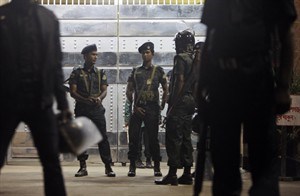
Bangladeshi security personnel stand guard outside the Central Jail, where Abdul Quader Mollah, leader of the country's largest Islamic party Jamaat-e-Islami, is being held in Dhaka, Bangladesh, Tuesday, Dec. 10, 2013. A senior judge of Bangladesh’s Supreme Court has halted the scheduled execution of the opposition leader, convicted for war crimes, until Wednesday morning as defense lawyers moved to him seeking postponement of the process, a defense lawyer said. (AP Photo, A. M. Ahad)
December 10, 2013 - 11:07 PM
DHAKA, Bangladesh - Lawyers for an Islamist opposition leader in Bangladesh were trying to get his death sentence thrown out Wednesday after a late reprieve saved his life just hours before he was to be hanged.
Abdul Quader Mollah, convicted of war crimes during the nation's war of independence against Pakistan in 1971, was due to be executed at 00:01 Wednesday, but lawyers went to the home of Judge Syed Mahmud Hossain and secured a postponement.
Now, the lawyers are trying to convince the Supreme Court to throw out the sentence in a case that could usher in a fresh wave of political violence ahead of national elections set for next month.
Mollah's party, the Jamaat-e-Islami party, issued a statement warning of "dire consequences" if he was executed.
Thousands of people who supported the execution of Mollah had gathered Tuesday night at a major intersection in the capital, Dhaka, to celebrate, but were instead shocked by the reports of the postponement. Many Facebook users in Bangladesh expressed their dissatisfaction over the legal tangles that delayed carrying out the death sentence.
As authorities finalized the time for the execution many mobile phone users in Bangladesh got a short message from an unknown number that said if Mollah was executed a civil war could break out. The Bangladesh Telecommunication Regulatory Commission said it is trying to determine who sent the message.
On Tuesday night, defence counsel Sazzad Ali Chowdhury said the postponement gave them time to file the petition which the Supreme Court's Appellate Division was reviewing Wednesday.
Mollah's family had met him at a Dhaka jail for what was expected to be the last time.
The execution would be the first from special trials begun by Prime Minister Sheikh Hasina in 2010 for suspects accused of crimes during the nation's war of independence against Pakistan in 1971. The government says Pakistani soldiers, aided by local collaborators, killed 3 million people and raped 200,000 women during the nine-month war.
Carrying out the execution would complicate an already critical political situation in Bangladesh, where the opposition has carried out violent protests for weeks to back a demand for a non-party caretaker government to oversee the general elections early next year.
The government has rejected that demand and said a political government headed by Hasina would conduct the election.
The election is set for Jan. 5, but an alliance led by opposition leader Khaleda Zia plans to boycott it. Weeks of blockades and general strikes have left nearly 100 people dead since October. Mollah's party has been banned by the Election Commission from taking part in election.
Deadly clashes have followed court verdicts against six other current and former officials of the Islamic party, an ally of the main opposition Bangladesh Nationalist Party, and extra police were stationed in the capital to head off any violence. Paramilitary guards were on standby across the country.
Mollah's party and Zia's Bangladesh Nationalist Party say the trials are a politically motivated bid to weaken the opposition. International human rights groups have raised questions about the impartiality of the tribunal. Authorities have denied the allegations.
Mollah was found guilty by the special tribunal in February and sentenced to life in prison. The Supreme Court changed the penalty to a death sentence in September, triggering deadly clashes and a nationwide general strike.
News from © The Associated Press, 2013